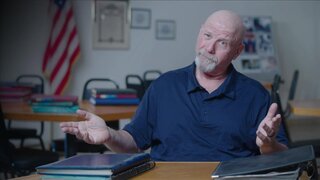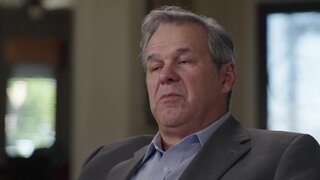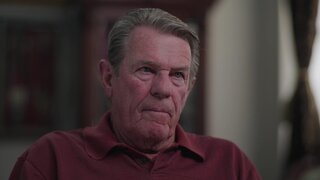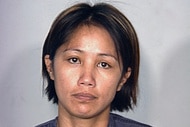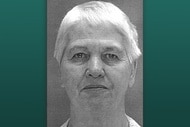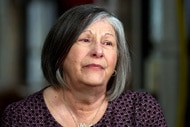Create a free profile to get unlimited access to exclusive videos, breaking news, sweepstakes, and more!
Why Some Believe The Infamous Menendez Brothers Should Be Released From Prison
Lyle and Erik Menendez were sentenced to life in prison for killing their parents in their Beverly Hills mansion more than 30 years ago. Today, a new generation thinks they didn't get a fair trial.
The sensationalized trial of Lyle and Erik Menendez during the 1990s continues to be a source of fascination and debate, especially in light of social media and the #MeToo movement.
It was shortly before midnight on Aug. 20, 1989, when patrol officers were called to a double shooting in the affluent and otherwise quiet neighborhood of Beverly Hills. Lyle Menendez, then 21 years old, called 911 to report that he and his 18-year-old brother, Erik Menendez, had returned from the movie theater and the “Taste of L.A.” event in Santa Monica to find someone had murdered their mother and father.
“They went home to get Erik’s false identification he had so they could go to a bar,” retired Beverly Hills Detective Sgt. Thomas Edmonds told Blood & Money, airing Saturdays at 9/8c on Oxygen. “That’s when they discovered the murder.”
Parents José and Kitty Menendez were shot multiple times with a shotgun in the den of their mansion.
The brothers were taken in for questioning but were outwardly distraught.
Police began their investigation by looking into José, a Cuban immigrant who’d become a self-made millionaire in the video business. He’d met Kitty at Southern Illinois University before they had Lyle and Erik, raising the pair in New Jersey. Lyle showed promise as an up-and-coming tennis athlete, while Erik had aspirations of getting into politics.
The Menendez family moved to the West Coast in the fall of 1986 when José — who’d previously made a career with RCA records — accepted a job with a company called Live Entertainment. Lyle, however, stayed on the East Coast to attend Princeton University.
On the outside, things seemed quite normal for the family, begging the question: who would want to kill L.A.’s newest executive and his wife in cold blood?
“There was no evidence that this was a residential robbery,” said Edmonds. “So, it was strictly a hit. Kill José, kill Kitty.”
The case was assigned to former Los Angeles County Deputy District Attorney Pamela Bozanich, who’d worked in the organized crime sector. Early on, investigators ran on the theory that José might have rubbed elbows with the mob in the course of his work. Relatives claimed José had a business deal go south with Live Entertainment President Noel Bloom, who was allegedly connected to the mob.
But ultimately, Bloom had an alibi, and detectives were back to ground zero.
“I had heard that [José] was just a nightmare to work with,” according to Bozanich. “He yelled and screamed a lot, he was brutal to people. I had been told that right after his murder, people were pretty pleased that he was no longer on the earth.”
More of José’s business ventures sent detectives looking into a transaction between José and a New Jersey-based businessman who’d sold José a pornographic film company. Police headed east to speak with the businessman, and though he admitted to being connected to the mob, he denied knowing anything about José and Kitty’s murders.
With California investigators on the East Coast, they began interviewing the Menendez family’s New Jersey-based relatives. Some said José planned to take Lyle and Erik out of the will for fears they’d blow their inheritance on their new girlfriends.
Those in the know said José was also concerned because his sons helped commit several burglaries in the Los Angeles area, taking about $100,000 in jewelry and cash the previous year. José reportedly made a deal with the district attorney to get Erik — who was still a minor — a slap on the wrist in exchange for pleading guilty, while both brothers were required to enter counseling.
Homicide detectives wondered if money could have been the motive after learning Lyle and Erik stood to inherit $650,000 in the event of their father’s death, as well as the multi-million-dollar mansion. Suspicions were raised when Lyle and Erik used the life insurance money to make head-turning purchases, including a Porsche Carrera, Rolex watches, and a $60,000-per-year tennis coach for Lyle’s continued lessons. Lyle also purchased his own chicken wing restaurant back in New Jersey.
“It was just in the news, constantly,” said family friend John Burnett. “You couldn’t escape it.”
Leads ran dry, until months later, in March 1990, when a woman named Judalon Smyth went to detectives. Smyth claimed her former boyfriend, a psychologist named Dr. Jerome Oziel — who’d professionally seen the brothers over the previous burglary charges — disclosed that Lyle and Erik made in-session confessions to killing their parents. Smyth claimed Oziel recorded the brothers’ admissions on tape.
Though Oziel’s disclosure violated doctor-client privilege, it was enough for investigators to take a closer look at the brothers.
“The key, in my book, was Judalon Smyth told us that the shotguns were brought in San Diego,” according to Det. Edmonds. “There’s only so many gun stores in San Diego.”
Investigators looked through the ledger of the second gun store on their list, finding two shotguns were purchased by Donovan Goodreau, a friend of Lyle’s from New Jersey. Goodreau, who was on the East Coast when the transaction occurred, said his ID card had been stolen or lost while in Lyle’s Princeton dorm room.
The firearms matched the weapons used to kill José and Kitty, prompting the district attorney to file charges.
Lyle was arrested near their home on March 8, 1990, while Lyle, then competing in a tennis match in Israel, was arrested at LAX airport upon his attorney-arranged return to the United States.
The brothers were tried together, but two juries were assigned to the case since their testimonies could implicate one another. Spectators were taken aback when, during opening arguments, Lyle’s defense attorney, Jill Lansing, told jurors, “Lyle and Erik Menendez killed their parents.”
At the heart of the trial wasn’t whether the brothers killed their parents but whether they should be charged with murder or manslaughter.
“This trial will take you behind the facade of the rich houses, the fancy cars, the wealthy friends, and impressive social engagements,” Lansing told jurors. “It will take you to the life that was experienced by Lyle Menendez and his brother as they grew up.”
Both Lyle and Erik gave convincing and emotional testimony that they were subjected to physical abuse at the hands of their father. On the stand, Erik admitted that, just days before their parents’ murders, he told his older brother that their father had molested him.
Lyle testified that he believed his brother because he, too, was allegedly sexually assaulted by José at a young age.
“I believed every word he said,” said juror Wendy Delahunt.
Relatives’ testimony supported the brothers’ claims, including an uncle who said he watched José use a closed fist to punch a then 5-year-old Lyle in the face. One by one, family members testified to the abuse, with a cousin confirming that the boys told them about the sexual abuse years earlier.
José’s mother, the boys’ grandmother, also supported Lyle and Erik throughout the trial, according to Delahunt.
Jurors heard Lyle, just days before the double murder, confronted his father about him continuing to sexually abuse Erik, which erupted into Lyle threatening to expose the family’s dark secret. José allegedly threatened to kill their sons to keep the truth from getting out, according to the brothers’ testimonies.
Lyle and Erik confessed to buying the shotguns on Aug. 18, 1989 — just two days before the murders — in case they needed them for protection. They planned on spending as little time as possible in the home, but on the night of the murders, José reportedly forbade the boys from going out, prompting a heated argument.
According to their statements, the brothers left to get their guns, returning a short time later.
“I just remember firing,” Erik told the court.
“You could hear things breaking and you could hear the ringing noises from the booms,” Lyle testified. “It was the smoke of the guns, and it was basically just chaos.”
Lyle and Erik anticipated the noise would prompt law enforcement to show up at their home, but when they hadn’t, they hatched their plan to ditch their weapons and call 911.
In December 1993, jurors began weeks of deliberations but couldn’t agree to the charges, resulting in a hung jury.
“We took a first vote: Six women, manslaughter, six men, first-degree,” said Delahunt. “The men said the boys were lying; the women believed totally different… we were hopelessly deadlocked.”
The Menendez brothers’ second trial began at the Los Angeles Superior Court in Van Nuys one and a half years later in August 1995. This time, testimony about José Menendez’s alleged abuse was severely limited.
On March 20, 1996, Lyle and Erik Menendez were found guilty of first-degree murder and sentenced to life in prison without the possibility of parole.
“I was devastated,” said family friend John Burnett.
Opinions nationwide were divided over whether they deserved to live and die behind bars.
“I still believe that the Menendez brothers did what they did out of fear because they felt that they were gonna be killed,” said Delahunt.
The case returned to the spotlight in 2017, when Erik participated in a tell-all for a documentary while serving his sentence, appealing to a new generation navigated by social media and living against the backdrop of the #MeToo movement, according to New York Times journalist Ezra Marcus. The case especially gained attention as the world faced the COVID-19 pandemic.
“When this younger generation is learning about the Menendez case, they’re able to draw on a very vivid, primary source, which was the recording of this trial,” said Marcus.
During the pandemic, the trial was streamed on Court TV, and with the new sets of eyes belonging to a generation more compassionate toward sex abuse victims, many voiced their opinion that Lyle and Erik should have been charged with manslaughter. The men would likely be out of prison by now if that were the case.
Commentators also pointed out gender bias — something the brothers had been publicly arguing since their trial — and that there might have been a different outcome, had the defendants been female. Today, clips and videos of the trial have been shared across social media millions of times, many calling for justice.
“At the time, crime was this black-and-white thing,” said Marcus. “This younger generation is learning about the Menendez case. They believe this was an improper prosecution.”
Many continue to urge politicians and prosecutors to take a new look at the Menendez brothers’ case. Others, like some of the detectives in the initial investigation, disagree.
“Justice was served,” Det. Edmonds contended. “They got what they deserved for a vicious crime where two people got murdered.”
Lyle and Erik continue serving life sentences, regularly leading therapy groups behind bars.

